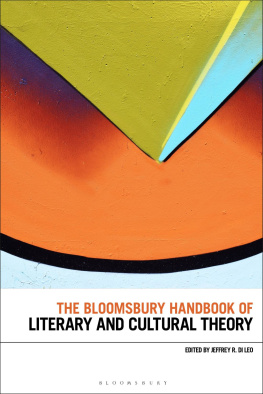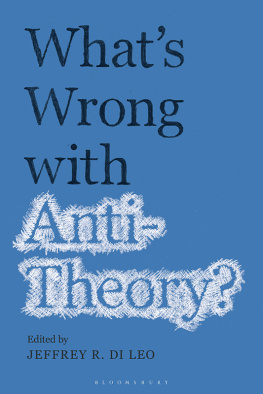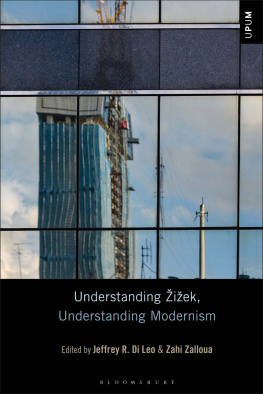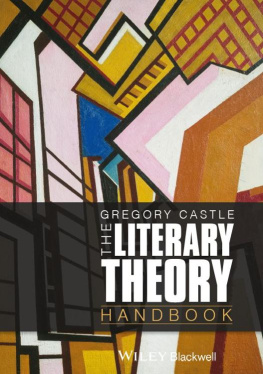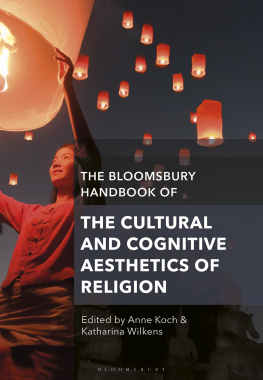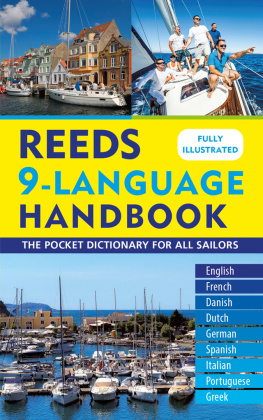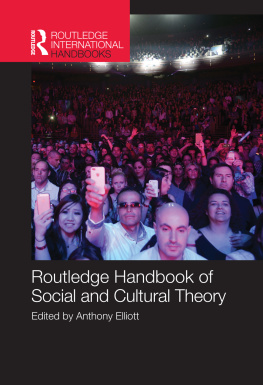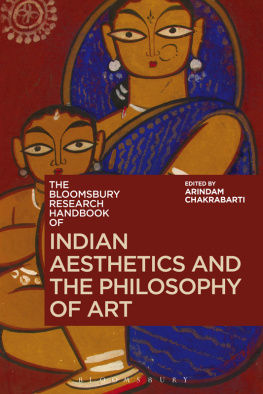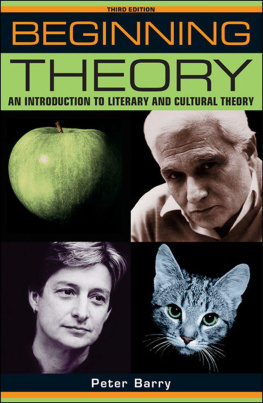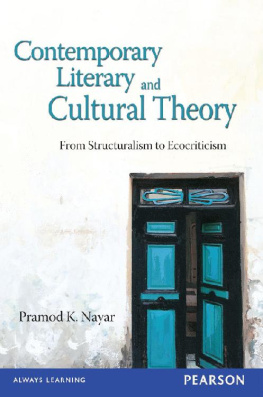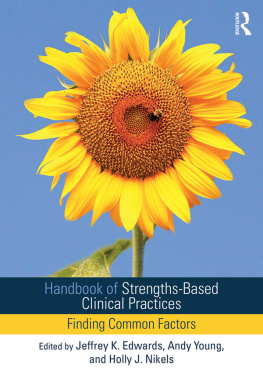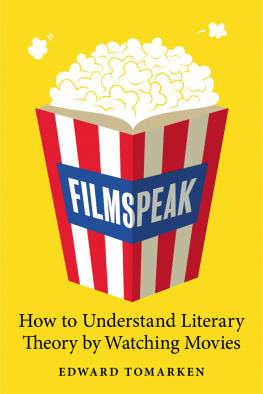Jeffrey R. Di Leo - The Bloomsbury Handbook of Literary and Cultural Theory
Here you can read online Jeffrey R. Di Leo - The Bloomsbury Handbook of Literary and Cultural Theory full text of the book (entire story) in english for free. Download pdf and epub, get meaning, cover and reviews about this ebook. year: 2018, publisher: Bloomsbury UK, genre: Politics. Description of the work, (preface) as well as reviews are available. Best literature library LitArk.com created for fans of good reading and offers a wide selection of genres:
Romance novel
Science fiction
Adventure
Detective
Science
History
Home and family
Prose
Art
Politics
Computer
Non-fiction
Religion
Business
Children
Humor
Choose a favorite category and find really read worthwhile books. Enjoy immersion in the world of imagination, feel the emotions of the characters or learn something new for yourself, make an fascinating discovery.
- Book:The Bloomsbury Handbook of Literary and Cultural Theory
- Author:
- Publisher:Bloomsbury UK
- Genre:
- Year:2018
- Rating:3 / 5
- Favourites:Add to favourites
- Your mark:
- 60
- 1
- 2
- 3
- 4
- 5
The Bloomsbury Handbook of Literary and Cultural Theory: summary, description and annotation
We offer to read an annotation, description, summary or preface (depends on what the author of the book "The Bloomsbury Handbook of Literary and Cultural Theory" wrote himself). If you haven't found the necessary information about the book — write in the comments, we will try to find it.
The Bloomsbury Handbook of Literary and Cultural Theory — read online for free the complete book (whole text) full work
Below is the text of the book, divided by pages. System saving the place of the last page read, allows you to conveniently read the book "The Bloomsbury Handbook of Literary and Cultural Theory" online for free, without having to search again every time where you left off. Put a bookmark, and you can go to the page where you finished reading at any time.
Font size:
Interval:
Bookmark:

THE BLOOMSBURY
HANDBOOK OF LITERARY
AND CULTURAL THEORY
Bloomsbury Handbooks in Literary Studies
The Bloomsbury Handbook of Electronic Literature , edited by Joseph Tabbi
The Handbook to the Bloomsbury Group , edited by Stephen Ross and Derek Ryan
Forthcoming
The Bloomsbury Handbook of Contemporary American Poetry , edited by Craig Svonkin and Steven Gould Axelrod
The Bloomsbury Handbook of 21 st -Century Feminist Theory , edited by Robin Truth Goodman
The Bloomsbury Handbook of Literary and Cultural Theory
Edited by Jeffrey R. Di Leo

Contents
Jeffrey R. Di Leo
Paul Allen Miller
Herman Rapaport
Gerald Prince
Peter Hitchcock
Daniel T. OHara
Harold Aram Veeser
Jean-Michel Rabat
Steven Mailloux
Henry Sussman
Robin Truth Goodman
John Frow
Jeffrey T. Nealon
Nicole Simek
Claire Colebrook
Gregg Lambert
Aaron Jaffe
Alexander Beecroft
Brian OKeeffe
Toby Miller
Joseph Tabbi
Henry A. Giroux
Mike Hill
Christopher Breu
Zahi Zalloua
Jeffrey J. Williams
Sean Grattan
Vincent B. Leitch
Many of the contributors to this book I have come to know and admire through my work as editor of symplok, and executive director of the Society for Critical Exchange and its Winter Theory Institute. To them is my greatest debt of gratitude.
The notion that theory is a community offered in the introduction to this book is their faultnot mine. Their collegiality and collaboration in pursuit of theory has led me to this conclusion. It is an unshakeable one that has only grown stronger over the years. Though we may differ in our views as to theorys strengths and weaknesses, heroes and villains, the shared pursuit of theory trumps these differences.
Id also like to thank all of those who have contributed to this book that I have come to know through our collaborative work on this handbook. The experience of getting to know so many distinguished scholars and practitioners of theory from around the world primarily through correspondence on this book has been a rewarding and special experience for me. Thank you for sharing your insights on theoryand for working within the time and space constraints of this bookwhich as I know from many of you was not an easy thing. Your collective good will is much appreciated.
The idea for this Handbook was presented to me by David Avital of Bloomsbury. While working together on another project, we started to discuss this one over coffee in Vienna. The notion that it would not be a memorial to theory in the sense of just looking back at its past, but rather a more vibrant book that looks forward to its futures was one upon which we agreed. So too was a balance between the old and the new in theory. And so work on the book began. I deeply appreciate his unflagging encouragement regarding this project, and support in shepherding it through the peer review and publication process.
I am also grateful to Keri Farnsworth for her assistance in the production of this book, particularly in the early stages when I was facing the organizational challenges of a book that would involve hundreds of entries and contributors; to Vikki Fitzpatrick for her administrative support, especially in securing materials used for the development of this book; and to the late John Fizer of Rutgers University for introducing me to literary theory.
Finally, I would like to thank my wife Nina, for her unfailing encouragement, support, and patience.
A
Daniela Agostinho, University of Copenhagen (Denmark)
Manuel Aguirre, Universidad Autnoma de Madrid (Spain)
Thomas Allen, University of Ottawa (Canada)
Charles Altieri, University of California, Berkeley (United States)
Carlos M. Amador, Michigan Technological University (United States)
Eyal Amiran, University of California, Irvine (United States)
Michael Amrozowicz, University at Albany, SUNY (United States)
Myrdene Anderson, Purdue University (United States)
Sean Johnson Andrews, Columbia College Chicago (United States)
Paul Ardoin, University of Texas, San Antonio (United States)
B
Andrew Baerg, University of Houston-Victoria (United States)
Ian Balfour, York University (Canada)
Ian Barnard, Chapman University (United States)
Kiff Bamford, Leeds Beckett University (United Kingdom)
Jae Basiliere, Grand Valley State University (United States)
Jason M. Baskin, University of Exeter (United Kingdom)
Megan Becker-Leckrone, University of Nevada, Las Vegas (United States)
Alexander Beecroft, University of South Carolina (United States)
Michael C. Behrent, Appalachian State University (United States)
Charles Bernstein, University of Pennsylvania (United States)
R. M. Berry, Florida State University (United States)
Greg Bird, Wilfrid Laurier University (Canada)
Jacob Blevins, Sam Houston State University (United States)
Ronald Bogue, University of Georgia (United States)
Jay David Bolter, Georgia Institute of Technology (United States)
Marc Bousquet, Emory University (United States)
Michael Boylan, Marymount University (United States)
Christopher Breu, Illinois State University (United States)
Sarah Brouillette, Carleton University (Canada)
Bill Brown, University of Chicago (United States)
Carolyn E. Brown, University of San Francisco (United States)
Nicholas Brown, University of Illinois, Chicago (United States)
Gerald L. Bruns, The University of Notre Dame (United States)
Ashley Byock, Edgewood College (United States)
C
Mark Canuel, University of Illinois, Chicago (United States)
Sarah Phillips Casteel, Carleton University (Canada)
Nicholas Chare, Universit de Montral (Canada)
Szu-Ying Chen, University at Albany, SUNY (United States)
Flore Chevaillier, Texas State University (United States)
Keridiana Chez, City University of New York (United States)
Robert Chodat, Boston University (United States)
Ralph Clare, Boise State University (United States)
Richard A. Cohen, University at Buffalo (United States)
Tom Cohen, University at Albany, SUNY (United States)
Vincent Colapietro, Penn State University (United States)
Andrew Cole, Princeton University (United States)
Claire Colebrook, Penn State University (United States)
Daniel Conway, Texas A&M University (United States)
Eleanor Courtemanche, University of Illinois, Urbana-Champaign (United States)
Clayton Crockett, University of Central Arkansas (United States)
D
Lennard Davis, University of Illinois, Chicago (United States)
Leland De la Durantaye, Claremont McKenna College (United States)
Steven Delmagori, University at Albany, SUNY (United States)
Shane Denson, Stanford University (United States)
Jeffrey R. Di Leo, University of Houston-Victoria (United States)
Robert Doran, University of Rochester (United States)
David B. Downing, Indiana University of Pennsylvania (United States)
Alan R. Dunn, University of Tennessee (United States)
John N. Duvall, Purdue University (United States)
E
Andrew Edgar, Cardiff University (United Kingdom)
John R. Ehrenberg, Long Island University (United States)
Stuart Elden, University of Warwick (United Kingdom)
Caryl Emerson, Princeton University (United States)
Font size:
Interval:
Bookmark:
Similar books «The Bloomsbury Handbook of Literary and Cultural Theory»
Look at similar books to The Bloomsbury Handbook of Literary and Cultural Theory. We have selected literature similar in name and meaning in the hope of providing readers with more options to find new, interesting, not yet read works.
Discussion, reviews of the book The Bloomsbury Handbook of Literary and Cultural Theory and just readers' own opinions. Leave your comments, write what you think about the work, its meaning or the main characters. Specify what exactly you liked and what you didn't like, and why you think so.

